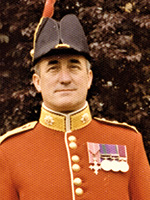|
Major (QM) Peter Horsfall MBE
Late Coldstream Guards
by Brigadier Richard Heywood OBE DL
formerly Coldstream Guards
|
 Peter Horsfall, who died on 4th September 2021 aged 91, joined the Coldstream Guards as a Drummer Boy in 1946 when only 16, having been turned down by the Royal Marines for being too old. He grew up in Leeds, where he enlisted in the Army. All his Regimental service was with the 2nd Battalion Coldstream Guards, and he went with them to Malaya for two years in 1948. In 1952, when back in Wellington Barracks, he was promoted to Lance Sergeant and soon after was persuaded to leave the Corps of Drums to further his career at duty. Following a spell with the Battalion in Germany he served in the Guards Training Battalion at Pirbright as a Lance Sergeant instructor. When the Royal Army Ordnance Corps tried to poach him to become their Drum Major, he was rapidly promoted to Sergeant. Peter Horsfall, who died on 4th September 2021 aged 91, joined the Coldstream Guards as a Drummer Boy in 1946 when only 16, having been turned down by the Royal Marines for being too old. He grew up in Leeds, where he enlisted in the Army. All his Regimental service was with the 2nd Battalion Coldstream Guards, and he went with them to Malaya for two years in 1948. In 1952, when back in Wellington Barracks, he was promoted to Lance Sergeant and soon after was persuaded to leave the Corps of Drums to further his career at duty. Following a spell with the Battalion in Germany he served in the Guards Training Battalion at Pirbright as a Lance Sergeant instructor. When the Royal Army Ordnance Corps tried to poach him to become their Drum Major, he was rapidly promoted to Sergeant.
In 1956 he went to the Guards Depot as a Superintending Sergeant, which involved training the Brigade Squad and was the first of many encounters he had instructing potential officers. Such was his leadership and skill with young gentlemen that they respected him hugely. After 18 months with the 2nd Battalion in Kenya he went to Sandhurst as an instructor in 1961 and served under Academy Sergeant Major Lord; there was much empathy and respect between them, and Peter learnt fast.
Having proved himself to be immaculate on the square, he showed himself to be equally adept at accounting, as a Company Quartermaster Sergeant. Wanting things to be done properly and thoroughly, he taught young officers in his Company how to rigorously check his books. Shortly before the Battalion went to Aden, he was promoted to Company Sergeant Major. He did outstandingly on operations and when three of his young Guardsmen were killed in a mortar attack, he stayed in touch with their parents for years to come.
Soon after Aden he became a Drill Sergeant, firstly in the Battalion and then at Mons Officer Cadet School. Back to the Battalion as Regimental Quartermaster Sergeant for the move to Münster before being promoted to Regimental Sergeant Major at Mons Officer Cadet School. He was disappointed not to become Sergeant Major of the Battalion, but no one in the Army was better qualified than him to oversee officer cadet training. It was no surprise that he did outstandingly there, which culminated in him being awarded the MBE. He was the last Regimental Sergeant Major at Mons before its role moved to Sandhurst.
Peter’s first job on receiving a Regular Commission was Catering Officer at the then very large Guards Depot and after that he became Quartermaster of the 2nd Battalion at Victoria Barracks, Windsor. The death of Field Marshal Montgomery at the same time as getting new Colours kept him busy. Major Willie Rous was the Second in Command, later to become the 27th Colonel. He and Peter made a formidable partnership and they greatly respected one another; indeed, Peter dedicated his autobiography to him. In 1976 the Battalion moved to Londonderry and with Battalion members sometimes in as many as 37 different locations, there was plenty for the Quartermaster to do. Whilst in Northern Ireland Peter came to the notice of the General Officer Commanding, Lieutenant General Sir David House and this was to be fortunate for them both. General David went on to be Black Rod and Peter was selected to be the Staff Superintendent at the House of Lords. For his exemplary work in Northern Ireland Peter received a General Officer Commanding’s Commendation. He finished his 35 years of military service as a Major and once again at the Guards Depot, this time as the Quartermaster.
His 15 years as the Staff Superintendent at the Lords were busy and coincided with several changes there that he had to oversee, but his military training stood him in good stead and he was universally popular, admired and respected; not least for his ability to get on well with others, however junior or very senior! It amused him to be rubbing shoulders again in the Lords with some of those whom he had originally trained at the Depot, Sandhurst or Mons. He was fond of sport and especially cricket; he came to know several great English cricketers and also some of the Australian legends, who played under Donald Bradman. He was a member of the MCC and Surrey County Cricket Club. He loved people and met many very famous ones, and he was a devoted family man. His beloved wife Mary predeceased him; he is survived by two sons, Terry and Bob and three grandchildren. Commiserations to Terry, who was unable to return from Australia for Peter’s funeral at the Guards’ Chapel and congratulations to Bob, who organised it with the skill of his father.
|
|